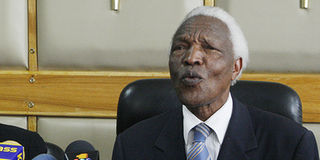First to face the truth test

Truth, Justice and Reconciliation Commission Chairman Bethwel Kiplagat (right) and Vice chair Ms Betty Murungi (left) address journalists at the office of the Justice minister Mutula Kilonzo on JULY 24 2009. PHOTO/JENNIFER MUIRURI
What you need to know:
Chairman served Moi regime that committed the atrocities he is to investigate, they say
Attempts to address past injustices and reconcile the country could be headed for major setback after victims and human rights campaigners rejected the appointment of Bethwel Kiplagat as the chair of the Truth Justice and Reconciliation Commission.
They questioned his suitability, citing his record as a strong defender of the Nyayo regime which he served as ambassador and permanent secretary.
Some of the victims vowed they would not appear before the commission.
And the Muslim community declared it would not support the commission, saying its membership did not represent the interests of Muslims.
Mr Kiplagat’s critics argue that he was a prominent member of the Moi regime at a time when the atrocities he was appointed to investigate were committed.
These include assassination of dissenting politicians, corruption, suppression of multi-party opponents, the media and human rights campaigners.
Political detainees such as Wanyiri Kihoro, Paddy Onyango, Njeru Kathangu and Koigi wa Wamwere said Mr Kiplagat had no history of defending the oppressed.
Release Political Prisoners Trust executive coordinator Stephen Musau said the appointment of Mr Kiplagat and Sheikh Farah “had not met the” expectations of the victims of injustice. The two, he said, had a “questionable” past.
Maj-Gen (retired) Ahmed Sheikh Farah was in the military at the time it was blamed for killings in northern Kenya.
Mr Musau said Mr Kiplagat’s suitability for the job was “wanting” and might compromise free participation of the people during the truth-telling processes.
“Will victims be willing and courageous enough to testify in a sitting where some commissioners are suspected to have supported human rights violations?”
Mr Wamwere said naming of Mr Kiplagat as chair of TJRC was “like appointing Jomo Kenyatta, Daniel Moi and Mwai Kibaki to probe their own regimes. It will not work.”
“Unlike Desmond Tutu of South Africa who was a champion of fighting apartheid, racism and oppression, Mr Kiplagat was a functionary of Moi dictatorship which he served faithfully,” said Mr Wamwere who was detained by the Moi administration.
The TJRC is modelled on a similar team chaired successfully by Archbishop Tutu after the end of apartheid.
But Mr Kiplagat invited his critics for talks saying that it is time for Kenyans to be genuine with each other.
Speaking when he convened the commission’s first meeting, Mr Kiplagat noted a lot of criticism has already started flowing since his appointment.
“Already we have seen some people raising concerns about this team. I want to meet such people and discuss with them the criticism because we are totally open,” Mr Kiplagat said.
He spoke at the commission’s first statutory meeting at Justice Minister Mutula Kilonzo’s office where they formally picked Nairobi lawyer Betty Murungi as vice-chairperson.
The move rectified an illegality caused by President Kibaki’s appointment of Mr Murungi while the law mandates the commission to do so.
However, the daughter of assassinated political maverick J.M Kariuki, Ms Rosemary Machua welcomed the choice, saying Mr Kiplagat had wealth of experience on conflict transformation.”
“The establishment of the commission was long overdue. The commission is good for justice as it would bring some closure to these sensitive matters,”
Dr Susan Mboya, the daughter of respected politician and trade unionist Tom Mboya said her family will wait and see what comes out of the process.
“We hope that process will heal wounds of families which have sought justice for decades,” she said.
Mr Onyango who vowed not to appear before the commission, said President Kibaki should have picked a chairman “who is purely independent and who has not been associated with the history of impunity at a time it was pestering.”
He noted that due to Mr Kiplagat’s association with the Moi regime, his loyalty to the mandate of TJRC cannot be vouched for.
Mr Kathangu, another detainee said the composition of the of the truth commission did not understand the suffering of victims of injustice.
He opposed Mr Kiplagat’s appointment, noting that though the diplomat’s “character displayed humility, he cannot deliver justice.”
Though he welcomed the commission, former MP saw the time as targeted to block the trial of post-election violence suspects by the International Criminal Court (ICC) at The Hague. “The commission is being brought now to pacify the country because of the Moreno-Ocampo effect.”
Mr Moreno-Ocampo, the ICC prosecutor, has received names of violence suspects put together by the Waki Commission which investigated the cause of the post-election chaos last year.
He cast doubt on Kenya’s ability to fight impunity by any local mechanism and advocated the trial of the suspects at the ICC.
Mr Kinyoro, who was detained in 1986, accused Mr Kiplagat of being part up of the “covering up machine” in the Moi Nyayo bureaucracy.
“ I was detained for organising protests against the Kanu government in London at a time when Mr Kiplagat was Kenya’s High Commissioner in London.
He added: “While we were exposing the oppression of the Kanu dictatorship and atrocities such as the Wagalla massacre abroad, Mr Kiplagat was the foremost defender of the Kanu government in London. He was a key pillar in the cover-up of past atrocities.”
The former Nyeri Town MP vowed though he supported its creation, he will not give the commission “the honour of appearing before it.” Survivors of Wagalla massacre also raised questions about the about Mr Kiplagat’s choice.
Mr Kiplagat is believed to have attended a security meeting that preceded the massacre. “How will Kiplagat chair a commission when he is supposed to be questioned over what he knows about the Wagalla issue?” posed human rights activist Salah Abdi Sheikh.




